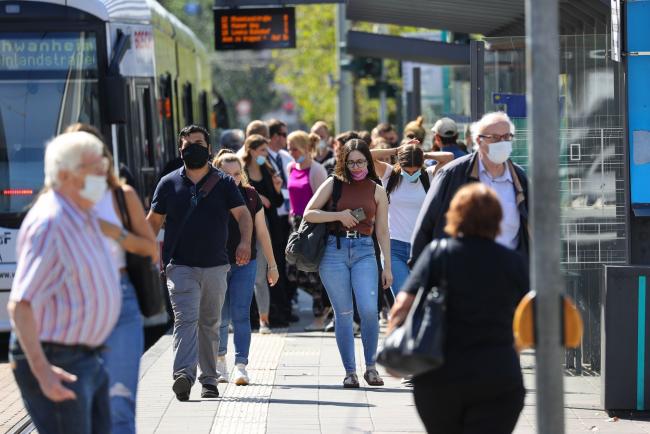(Bloomberg) -- Germany extended a program that has kept millions of people from losing their jobs, allocating around 10 billion euros ($11.8 billion) more to help Europe’s biggest economy recover from the coronavirus crisis.
At a meeting in Berlin that ended late Tuesday, Chancellor Angela Merkel’s coalition agreed to provide job-preserving subsidies until the end of 2021. The subsidies, known in German as “Kurzarbeit” and originally intended for 12 months, pay the bulk of paychecks and allow companies to hold on to workers during an economic shock.
Finance Minister Olaf Scholz said the money for the extension will come out of next year’s federal budget, adding to the 1.2 trillion euros Germany has made available to prop up the economy during the pandemic.
“Right now it’s about stabilizing the economy,” Scholz said Wednesday in an interview with ZDF television. “Because we acted swiftly and comprehensively, it has helped Germany come through the crisis much better than many other countries.”
Germany has used the compensation program to prevent mass layoffs before, helping the country weather the financial crisis just over a decade ago when Scholz was Labor Minister. There were about 5.6 million people receiving the benefits in July, compared with 7 million people in May, according to the Munich-based Ifo Institute for Economic Research.
‘Far From Normal’
The expanded benefits were part of a huge spending package aimed at helping the country emerge from the worst crisis in the postwar era, and the extension indicates that a rebound may take longer than initially anticipated.
Still, there was good news earlier on Tuesday with a report showing German companies have turned slightly more optimistic that the economy’s road to recovery will continue. Ifo’s business confidence gauge rose more than expected in August, while expectations also improved.
“We are seeing some fairly positive data on the current state of the economy,” Scholz told ZDF. “Things are going better than was feared a few weeks ago.”
Ifo President Clemens Fuest warned that while the recovery is on track, things are “far from normal,” and companies are likely to continue to cut jobs.
Germany’s wage-support program initially covers as much as 67% of net wages for households with children and increases over time. The European Commission is using the German program as a model for a regional effort to ensure that workers are furloughed and not sacked.
“It’s right that the most important instrument we have to fight the coronavirus crisis and secure jobs is continued in a practical and responsible way,” Annegret Kramp-Karrenbauer, the head of Merkel’s Christian Democratic party, said Wednesday in an interview with ZDF.
“The most expensive thing for the state would be mass unemployment and a mass extinction of companies and that’s exactly what intelligent use of Kurzarbeit cash can prevent,” she added. “That’s what we saw during the crisis in 2008 to 2009.”
Election Reform
Aside from the wage benefits, the coalition agreed on a contentious election reform. The changes will be implemented in two steps, starting in next year’s national vote and continued in 2025. The goal is to reduce the size of the lower house of parliament, which currently has a record 709 seats.
The number could have grown to more than 800 seats after the next election because of a system that grants additional representation depending on the results.
The coalition also agreed to use some of the cash from the European Union’s recovery fund to equip teachers with laptop computers at a cost of 500 million euros.
©2020 Bloomberg L.P.
